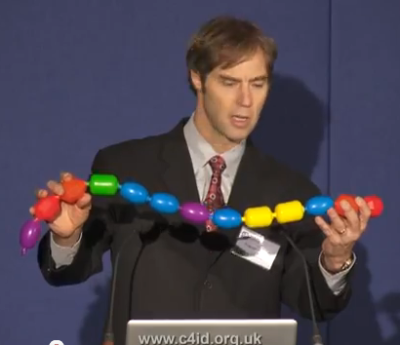What should we make of theistic evolutionists telling us that you can believe in God, while still knowing that matter, law and chance explain the full development of all of life?
Consider this quotation from from famous intelligent design Phillip E. Johnson.
Quote:
The National Academy’s way of dealing with the religious implications of evolution is akin to the two-platoon system in American football. When the leading figures of evolutionary science feel free to say what they really believe, writers such as Edward O. Wilson, Richard Dawkins, Daniel Dennett, Carl Sagan, Steven Pinker, Stephen Jay Gould, Richard Lewontin and others state the “God is dead” thesis aggressively, invoking the authority of science to silence any theistic protest. That is the offensive platoon, and the National Academy never raises any objection to its promoting this worldview.
At other times, however, the scientific elite has to protect the teaching of the “fact of evolution” from objections by religious conservatives who know what the offensive platoon is saying and who argue that the science educators are insinuating a worldview that goes far beyond the data. When the objectors are too numerous or influential to be ignored, the defensive platoon takes the field. That is when we read those spin-doctored reassurances saying that many scientists are religious (in some sense), that science does not claim to have proved that God does not exist (but merely that he does not affect the natural world), and that science and religion are separate realms which should never be mixed (unless it is the materialists who are doing the mixing). Once the defensive platoon has done its job it leaves the field, and the offensive platoon goes right back to telling the public that science has shown that “God” is permanently out of business. (The Wedge of Truth, IVP 2000, pp. 88-89).
So what naturalistic scientists believe is that God didn’t do anything to create the diversity of life – that nature does all of its own creating. In fact, it doesn’t matter if the best naturalistic explanation is improbable or implausible – scientists must bitterly cling to materialistic explanations of natural phenomena.
The problem for these scientists is that they are taxpayer-funded, and religious people don’t like paying to have scientists shoehorn reality into a pre-supposed naturalistic framework. Sometimes, religious people get annoyed about being told that sparking gases can create functional proteins. And sometimes, religious people get annoyed about being told that the universe oscillates eternally despite observations that falsify that speculative theory. And sometimes, religious people get annoyed about being told that there are as yet undiscovered fossilized precusors to the Cambrian era fossils.
Naturalists think that opposition to these lame naturalistic theories only ever be religiously-motivated. They cannot accept that people might question their naturalistic just-so stories on scientific grounds. So what do the naturalists do when faced with scientifically-motivated dissent that they think is religiously motivated? Well, they trot out “religious” scientists. These “religious” scientists claim to have a deep personal faith in God, and a belief in miracles. But these religious scientists believe that what actually happened is that law, matter and chance did all the creating of life. This is the “second platoon”. They are sent out to mislead the public by talking about their personal faith, and what God could and couldn’t do, and how evolutionists can believe in God without any evidence of intelligent causes in the history of life. The one question they most want to avoid is whether science, done in the ordinary naturalistic way, can discover evidence of intelligent agency in the history of the development of life.
So what is theistic evolution? Theistic evolutionists believe no intelligent causes are detectable in nature by science, and that no intelligent causes are needed to explain life. They like to say phrases like “God could” and “God might” and “I believe” and “I attend this church” and “I received a Christian award” and “I believe in miracles too”. But atheists and theistic evolutionists agree on what science shows about the diversity of life – intelligent causes didn’t do anything.
The quickest way to disarm a theistic evolutionist is to refuse to talk about religion or God, and to ask them to show you the naturalistic explanation of the Big Bang. And the naturalistic explanation of the fine-tuning. And the naturalistic explanation of the origin of life. And the naturalistic explanation of the Cambrian explosion. And so on. Focus on the science – don’t let them turn the conversation to their personal beliefs, or to the Bible, or to religion, or to philosophy. Ask them what they can show in the lab. If naturalistic mechanisms can do all the creating they say it can do, let’s see the demonstration in the lab.




